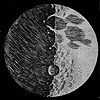|
za fevral' 2004 goda.
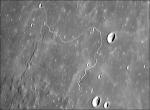 Marvelous Marius Rille
Marvelous Marius Rille
29.02.2004 | Lunnoe foto dnya
Sinuous rilles have led some lunar scientists astray. The curving outlines led to proposals that such rilles were meandering water streams, although by shape alone a giant worm might have been equally defensible! But the Moon's lack of water and life eliminate those origins.
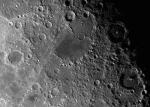 Angular Basin
Angular Basin
28.02.2004 | Lunnoe foto dnya
Hugging the northeastern edge of the Moon is a patch of mare at the center of the two-ring Humboldtianum impact basin. When seen from Earth under high sun lighting the dark mare floor is the most visible feature, and is 4.2 km lower than the basin edges according to Clementine altimetry data.
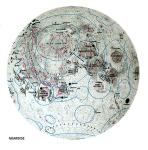 Structures of the Lunar Surface
Structures of the Lunar Surface
27.02.2004 | Lunnoe foto dnya
Structural geology is the study of the landforms caused by horizontal or vertical movement of the crust. On Earth, much of structural geology concerns faults and folds created by the forces of plate tectonics. On the Moon, most structural or tectonic features appear to be associated with impact basins.
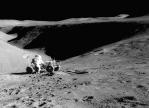 On the Moon with Apollo 15
On the Moon with Apollo 15
26.02.2004 | Lunnoe foto dnya
The most visually dramatic Apollo landing site was Apollo 15 - on the edge of Hadley Rille and almost in the shadow of the Apennine Mountains. The goal of that mission was to seek information on how both of these features formed.
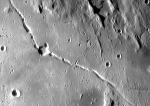 Say Hi to Hyginus
Say Hi to Hyginus
25.02.2004 | Lunnoe foto dnya
Each new high quality image of the Moon reveals things we may have overlooked before. This excellent image of Hyginus and its rille taken with the Ludiver 24" telescope shows features that are rarely imaged from the Earth. Hygenus is one of the largest craters on the Moon NOT likely to be of impact origin.
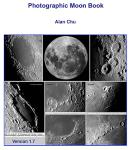 An Amateur's Moon
An Amateur's Moon
24.02.2004 | Lunnoe foto dnya
Computer technology has empowered each of us to become a publisher. Alan Chu, a skilled observer and photographer from Hong Kong, has made available his own Photographic Moon Book. Alan has taken more than...
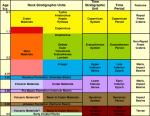 Rocks and Time on the Moon
Rocks and Time on the Moon
23.02.2004 | Lunnoe foto dnya
What we see on the Moon are rock units, many of which were formed instantaneously. For example, the crater Copernicus disrupted the existing lunar surface and spread deposits as rays and secondary craters - new rock units.
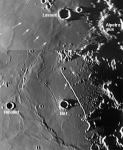 More Discoveries Near the Straight Wall
More Discoveries Near the Straight Wall
22.02.2004 | Lunnoe foto dnya
Low sun angle images continue to reveal new features on the Moon. An image of the Straight Wall by Thierry LeGault showed an apparent rille or fault running from the northern portion of the wall to the northeast.
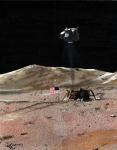 We're on our Way, Houston!
We're on our Way, Houston!
21.02.2004 | Lunnoe foto dnya
The last time humans were on the Moon was December 1972 - nearly 32 years ago! The inspiration from that magnificent and audacious journey still burns bright in some folks. In 1998, Jim Scotti, a scientist and artist at the Lunar and Planetary Lab in Tucson, painted this view of the last liftoff.
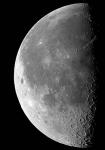 Last Quarter
Last Quarter
20.02.2004 | Lunnoe foto dnya
The last week of each lunation is largely unobserved by Earthlings, most of whom sleep through the night. The last quarter Moon rises about midnight and is at its highest at sunrise. At last...
